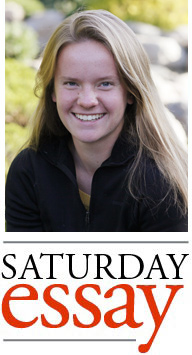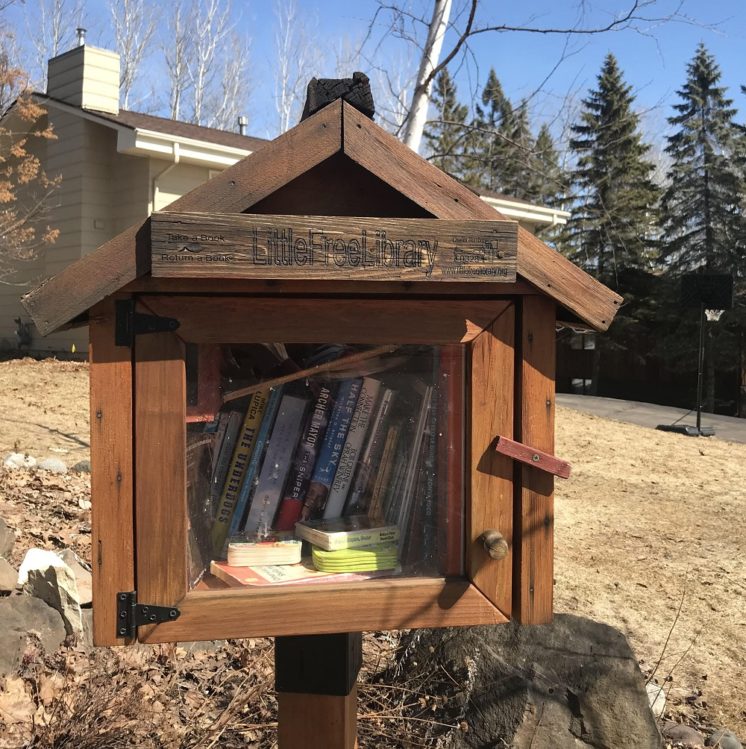Little Free Library Movement Still Growing
 Eight years ago the concept of neighborhood book exchanges made its way to Duluth. The original Little Free Library was built in Hudson, Wis., in 2009. Duluth had its first in 2012, and by 2013 there were about 20 in the city. Today there are roughly 40.
Eight years ago the concept of neighborhood book exchanges made its way to Duluth. The original Little Free Library was built in Hudson, Wis., in 2009. Duluth had its first in 2012, and by 2013 there were about 20 in the city. Today there are roughly 40.
It’s a global movement. The nonprofit Little Free Library organization estimates there are now more than 100,000 registered book exchanges in more than 100 countries worldwide.
If you’re unfamiliar with these little libraries, their appearance consists of a bird-house looking box, around 20 inches by 15 inches by 18 inches, typically with a Plexiglas door. Inside is an array of books assembled for the purpose of sharing. Anyone is welcome to take a book or leave a book.
There are 38 book exchanges in Duluth cataloged on littlefreelibrary.org, and several more are in surrounding communities. If you’re interested in where to find them, visit the Little Free Library website and search “Duluth,” “Superior” or the area of your choice. The locations will pop up and you can find the one closest to you.
There are also a few undocumented book exchanges in the area. Not everyone chooses to operate within the parameters of the Little Free Library organization. It’s difficult to estimate how many renegade boxes might be out there.
I grew up in the Twin Cities suburb Stillwater, where the little libraries also dwell among neighborhoods in the district. I recall when I was a sophomore in high school walking past my parent’s house on a dirt road to a particularly ornate library. It mimicked a farmhouse, painted white with a green roof, named Midnight Crossing with a wooden carving of a cowboy riding a horse on either side.
There were many individuals who came across the random library. I never met them; I knew them from books they left. It was a community — an odd, out-of-sorts book club that myself and a few others were a part of. I guess this was where my own experience with Little Free Libraries began, and like many other libraries, this one is not listed on the website. The idea that this little box was not known by many, but just a few, made the book exchanges more intimate, more unique, and perhaps gave me a sense of belonging.
In Duluth, Little Free Libraries are spread out on neighborhood streets, allowing individuals practically anywhere from Fond du Lac to the French River to access free books and give away their own.
In my short time living in Duluth, I’ve come across a few Little Free Libraries. I was curious about the growth of the libraries and their arrival to Duluth in 2012. What interested me was the practicality and use of the Little Free Libraries. I interviewed several individuals about their library and what has shaped them in the recent years.
Carol Surine told me she discovered Little Free Libraries by noticing them while driving. She got out of her car, read the placard, and looked for more information online.
“I live in rural Duluth, in a little neighborhood on a street about a mile long,” Surine said. “There are about 50 houses on my street, and we live quite a long way from the nearest library. I know that panicky feeling when there are hours stretching in front of me and no book to read, so I wanted to have a little place for others to find a book quickly.”
It’s fascinating that neighborhood book exchanges are still common with the ever-increasing use of technology. I love the idea that someone took the time, after seeing a Little Free Library, to research and have a friend build one of the small book huts. Perhaps I’m intrigued by this because I’m living in a generation that doesn’t read as actively as prior generations.
In my own time I’ve found a Little Free Library off Kent Road useful, as I had a friend living near there for a little while. It’s not that I was forced to look inside: it appeared inviting and intriguing. When free books present themselves, the bibliophile in me cannot help but look through them and hopefully find something worth reading.
Another question I asked Little Free Library owners, or “stewards,” was what books are in the library now? I was personally curious if anyone kept to their Little Free Library like a garden: planting books, watching the hut to make sure it stays well-cleaned, and re-planting any books that may have been dispersed over time. John Hinners responded to this question telling me he stocks everything from picture books for kids to good fiction and dense biographies. Gretchen Patten and Bruce & Stephanie Lunning also informed me that they keep children’s books in their Little Free Libraries.
Children may be an obvious focus for Little Free Libraries. They also might be some of the more important readers of any generation. I suggest that if you, or anyone around you, has children’s books to not simply throw them away, but spread them among Little Free Libraries throughout the city.
Neighborhood book exchanges enable convenience. This is why the Little Free Libraries movement has continued to grow in Duluth across the globe. Driving down East Superior Street one can find four or five Little Free Libraries. Not all of the libraries are on popular roads, but typically they are near parks, family-based neighborhoods, and public walkways.
One of the individuals I interviewed sent me a story from The Sun, a magazine that publishes monthly articles from poetry to photography, about the experience of owning a Little Free Library over a year-and-a-half period of time. The author, Jennifer Bowen Hicks, remarks on the miniature structures:
It is a small thing to leave a book, and it is a small thing to take a book, but it is no small thing to be invited into our shared humanity.
That article was published in 2019. Although it is a piece written in Minneapolis, we must understand that this movement is not a mere suggestion that individuals need to read more, but there is an ability to build community through Little Free Libraries. This was the case in my experience as a teenager reading these recycled books: I found a hobby. It was humorous how excited I got when I saw new books had arrived. The best part might have been that the books were free with no return policy.
Owners of Little Free Libraries informed me that over the past ten years the use of Little Free Libraries has increased. I’m not sure if this surprised me, but it definitely was pleasing to know that people are still reading. The Little Free Libraries remind me of an unorganized book club where people don’t read the same book but rotate in and out of what they’ve completed and grab the next book that catches their eye.
With regard to the increase of readers, Gretchen Patten told me she thinks “people are more willing to check it out when they happen by the library and also feel okay to take a book even if they don’t have one to put back.”
Deedee Olson had similar comments. “(I’m) not sure how many years I had the library, but people eventually started leaving books to share as well,” she said. “It got lots of traffic, I would see families out walking stop and select a book.”
I personally love seeing the libraries spread. There was one in particular on College Street that was unreachable due to snow throughout the winter. Yet the mere appearance of the Little Free Library is a sign of hope. Now that spring has come, slowly, the snowed-in library is available, and I hope to find some good reads inside.
With the recent outbreak of COVID-19 the Little Free Library organization published an article about keeping the book exchanges open, or closed during the pandemic. To read some guidelines for keeping them open, check out “Best Practices at Little Free Libraries During the Coronavirus Outbreak.” The books can be kept available if we all practice proper cleaning methods to ensure the safety of those continuing to utilize the libraries.
These book exchanges are landmarks. They are little oases when walking or driving. All that needs to be done to keep the movement going is to keep circulating books. Ten years may appear like a short while, but the growing use of Little Free Libraries encourages individuals to read and get out in Duluth to explore the intricate niches the city has to offer.
Recommended Links:
Leave a Comment
Only registered members can post a comment , Login / Register Here















1 Comment
David Syring
about 4 years ago